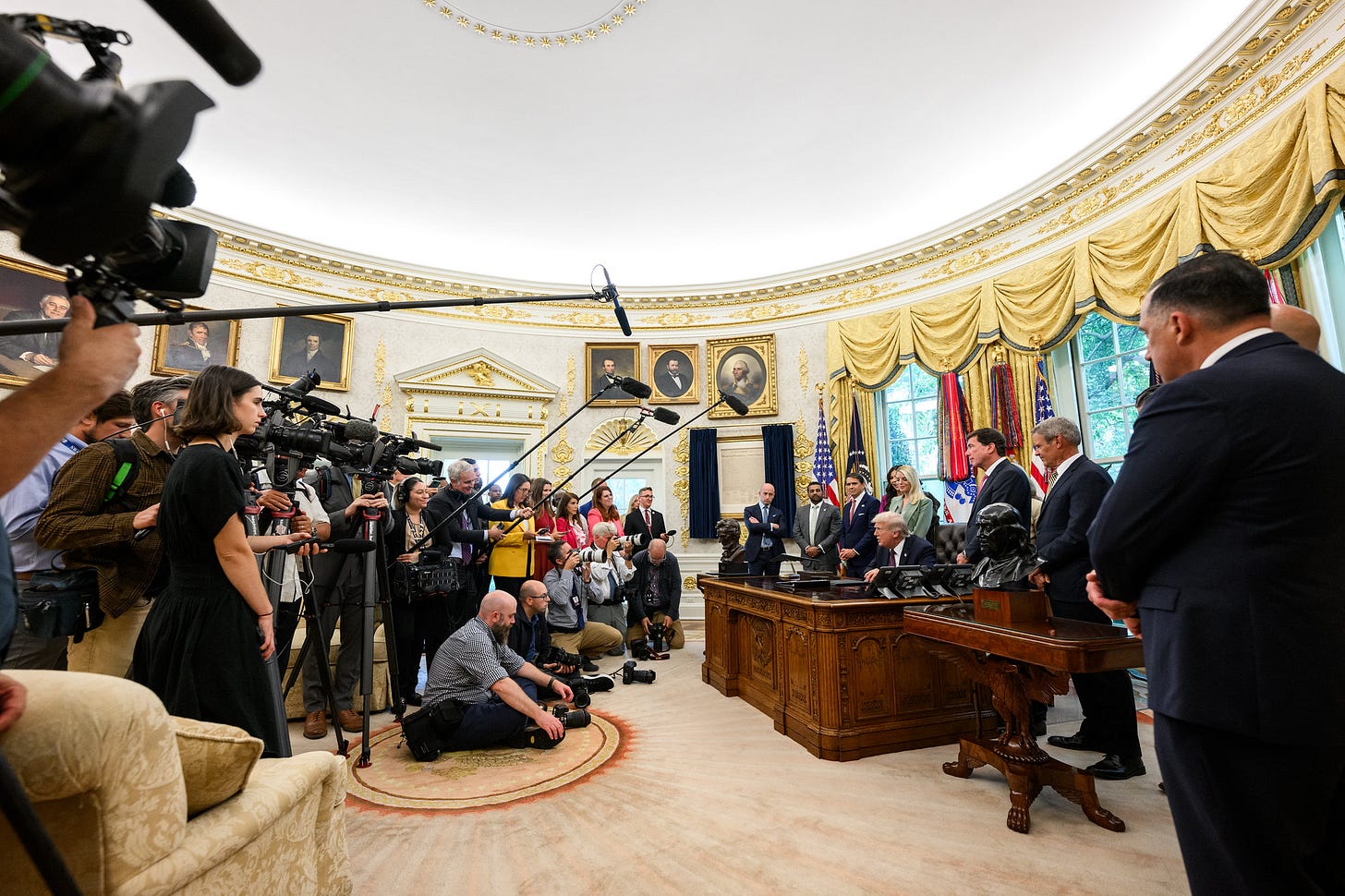One Question Can Change Everything

Sometimes the most powerful moments in journalism happen in the span of 30 seconds. A courageous journalist, a direct question, an unfiltered answer—and suddenly, the world shifts.
On September 15th, The Center Square’s Washington bureau chief Sarah Roderick-Fitch stood in the Oval Office as part of the White House pool reporters and posed a simple, straightforward question to President Trump: Would he designate Antifa as a terrorist organization?
His immediate response—“Yes, I would like to designate the Antifa movement as a terror organization”—became the shot heard around the world of journalism.
Within hours, every major news outlet in America was chasing the story. The Associated Press, Reuters, CNN, Fox News—all of them following The Center Square’s lead. The video clip ran on endless loops across cable news.
Our reporting dominated news cycles for days. But here’s what really matters: Within a week, President Trump followed through on his commitment. The Netherlands became the first nation to follow suit and Hungary the second.
Think about that for a moment. One question. Three governments changed their official stance on a controversial movement that has dominated headlines for years.
This is why being in the room matters. This is why asking direct questions matters. And this is why The Center Square exists.
I’ve been in this business long enough to remember when journalism was simpler, or perhaps the standards were higher—when reporters asked tough questions and politicians gave straight answers, or at least tried to dodge them in interesting, clever, or creative ways. Somewhere along the line, too many White House correspondents started asking about process instead of policy, about palace intrigue instead of public impact.
Not us. Not that day.
Sarah didn’t ask about the president’s tweets or his mood or what he thought about some congressman’s latest comments. She asked a substantive policy question that millions of Americans had been thinking about for years as they watched their cities burn during protests. She asked about accountability. She asked about public safety. She asked the kind of question that makes powerful people make definitive statements they can’t walk back.
“Antifa is terrible,” Trump said, adding, “They get away with murder.”
The response from the journalism establishment was telling. Some were stunned we’d gotten such a direct answer. Others seemed almost offended that the “new kids” had broken such a major story. But mostly, they did what journalists do when someone beats them to a story—they followed our lead and some begrudgingly gave us credit. Even our competitors had to acknowledge: The Center Square had just changed the game with regard to reporting on domestic terror.
News organizations grow as they grow trust. To earn a spot in the Oval Office was the product of more than six years of tireless grinding, asking difficult and challenging questions that break away from the pack to get at the issues that everyday Americans want to see addressed.
This moment crystallized everything we’ve been building toward. When we decided to pursue White House hard-card credentials, when we made the investment to place a bureau chief in D.C., when we committed to being part of the press pool rotation—all of it led to this moment. Our first time with a presidential question, and we made it count.
But here’s what I want you to understand: This wasn’t luck. There was preparation involved to meet the opportunity. Sarah knew exactly what question to ask because she understands a mission to hold the powerful to account and inform everyday American taxpayers. The Center Square is not there to play gotcha games or score political points. The wire exists to get answers to the questions that matter to the 141 million Americans we reach every day through our 1,330-plus local-market news-media partners.
The ripple effects continue even now. Metropolitan news organizations from Seattle to Miami used our reporting to examine Antifa’s presence in their communities. International news organizations cited our exclusive. Policy makers in other nations began their own discussions. All because one reporter asked one direct question and didn’t accept spin as an answer.
This is the power of journalism done right. Not opinion masquerading as analysis. Not partisan talking points dressed up as news. Not advocacy journalism. Just straight questions that prompt straight answers about issues that affect the lives of Americans.
Some folks in media circles asked me afterward if this changes our approach. Will we now chase sensational stories to maintain the spotlight? The answer is no.
This moment reinforces a core mission. The Center Square has a talented group of professional journalists spread out across the country. We keep asking the direct questions others avoid. We’ll keep pushing for substantive answers about government spending, effectiveness, and accountability. We’ll do the journalism that actually matters.
Because here’s the truth: In a world drowning in hot takes, manufactured outrage, and lecturing solutions-focused journalism that wilfully obfuscates truth-seeking, what I believe readers really want is someone in the room who will raise their hand and ask the burning question everyone else is too afraid to ask.
We provide the American public straight facts, because we respect our audience.
That’s The Center Square. It’s who we are. And that September day in the Oval Office, we proved that sometimes the simplest questions can change the world.
Plenty more of that to come.

